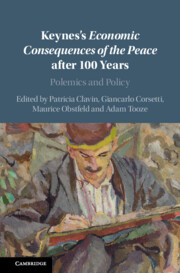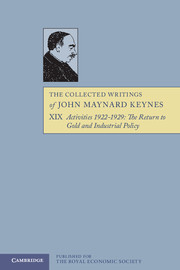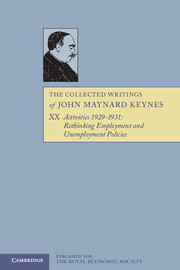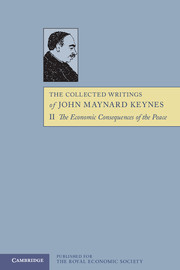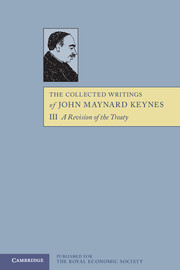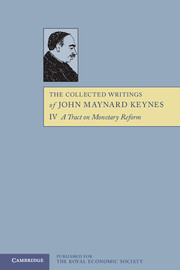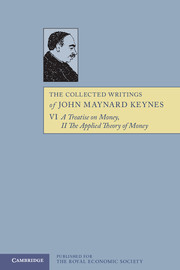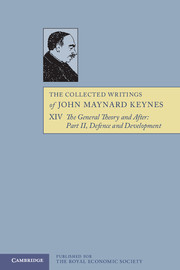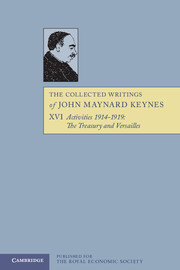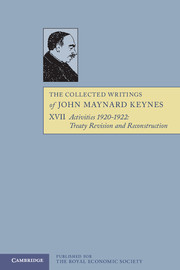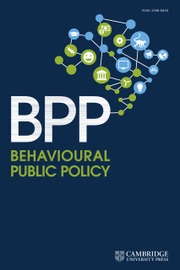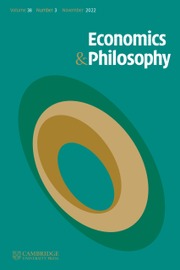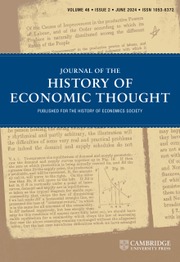Keynes's Economic Consequences of the Peace after 100 Years
Polemics and Policy
£120.00
- Editors:
- Patricia Clavin, University of Oxford
- Giancarlo Corsetti, University of Cambridge
- Maurice Obstfeld, Peterson Institute for International Economics, Washington DC
- Adam Tooze, Columbia University, New York
- Date Published: January 2024
- availability: In stock
- format: Hardback
- isbn: 9781009407519
£
120.00
Hardback
Other available formats:
eBook
Looking for an inspection copy?
This title is not currently available on inspection
-
The Economic Consequences of the Peace is one of the most famous books in the history of economic thought. It is also one of the most polemical. Published as a response to what Keynes saw as the grave errors of the Treaty of Versailles, the book predicted that war reparations and other harsh terms imposed on Germany would lead to its collapse, which in turn would lead to devastating consequences for Europe and the wider world. Predictions that we now know to have been all too accurate. Keynes's Economic Consequences of the Peace after 100 Years brings together an international team of experts to assess the legacy of Keynes's best-selling work. It compiles a series of wide-ranging chapters, exploring the varied influence of his ideas and policy contributions. Written in an accessible style, it recovers the importance of this history and examines the continued relevance of Keynes's controversial book.
Read more- Covers theory as well as history and links to current research
- Reveals how Keynes was writing at a time when these fields were just emerging, and interdisciplinary character of the political economy now, and then. Will appeal to readers in all these disciplines
- Includes a multi-disciplinary approach with contributions from fields of economics, history, and international relations
Reviews & endorsements
'The centenary of Keynes's 1919 classic, Economic Consequences of the Peace, is well worth marking. Keynes's prescient warnings of the dangers of nationalism and failures of international cooperation grow even more salient with the passage of time, and specifically now with Russia's war on Ukraine. The essays here are a reminder of the challenges before us as we seek to achieve a 'non-Carthagianian peace'.' Barry Eichengreen, University of California, Berkeley
See more reviews'Whether or not Economic Consequences of the Peace was as prescient as is sometimes said, the contributions to this fascinating volume attest that it still offers us innumerable windows on to that crucial conjuncture in history, and to a present that resembles it perhaps more closely than we would like. Keynes' insights, both where he was right and where he was not, clearly continue to stimulate insightful thinking about the political economy of capitalisms past and present.' Geoff Mann, Simon Fraser University
'John Maynard Keynes would be pleased to know that the savage attack he wrote on the peace settlements at the end of the First World War is still, a century later, provoking comment and debate. A distinguished team drawn from the leading experts on the period examine afresh, with insight and learning, the great and difficult questions of how to make peace after a long and exhausting conflict and build a stable new world order. Stimulating, timely and important.' Margaret MacMillan, Emeritus Professor of International History at the University of Oxford
Customer reviews
Not yet reviewed
Be the first to review
Review was not posted due to profanity
×Product details
- Date Published: January 2024
- format: Hardback
- isbn: 9781009407519
- length: 468 pages
- dimensions: 235 x 157 x 28 mm
- weight: 0.91kg
- availability: In stock
Table of Contents
1. Lessons of Keynes's economic consequences in a turbulent century Patricia Clavin, Giancarlo Corsetti, Maurice Obstfeld and Adam Tooze
2. The making of a classic: Keynes and the origins of the economic consequences of the peace Michael Cox
3. 'Keynes's economic consequences (1919): the book and its critics' Peter Clarke
4. ' Too bad to be true' Swedish economists on Keynes's the economic consequences of the peace and the German reparations, 1919–1929 Benny Carlson and Lars Jonung
5. Revisionism as intellectual‒political vindication or the French receptions of consequences after the two world wars (1919–46)
6. Between Cambridge, Paris, and Amsterdam Harold James and Andrew Koger
7. Keynes, the transfer problem, and how to pay for war reparations Simon Hinrichsen
8. The speculative consequences of the peace Olivier Accominotti, David Chambers and James Ashley Morrison 9. Why was Keynes opposed to reparations and Carthaginian peace? Elise S. Brezis
10. The one case where economic consequences of the peace mattered: the reshaping of economic mindset in early republican Turkey Eyüp Özveren
11. Keynes and international trade politics after the first world war Madeleine Dungy
12. Gold, international monetary corporation, and the tripartite agreement of 1936 Max Harris
13. Exchange rates, tariffs and prices in 1930s' Britain Jagjit S. Chadha, Jason Lennard, Solomos Solomou and Ryland Thomas
14. 'Unusual, unstable, complicated, unreliable and temporary' reinterpreting the Ebb and flow of globalization Michael D. Bordo and Catherine R. Schenk
15. Keynes's arc of discovery: from the economic consequences to Bretton woods David Vines
16. Keynes, the economic consequences of the peace, and popular perceptions of the first world war' Jonathan Boff.
Sorry, this resource is locked
Please register or sign in to request access. If you are having problems accessing these resources please email [email protected]
Register Sign in» Proceed
You are now leaving the Cambridge University Press website. Your eBook purchase and download will be completed by our partner www.ebooks.com. Please see the permission section of the www.ebooks.com catalogue page for details of the print & copy limits on our eBooks.
Continue ×Are you sure you want to delete your account?
This cannot be undone.
Thank you for your feedback which will help us improve our service.
If you requested a response, we will make sure to get back to you shortly.
×
